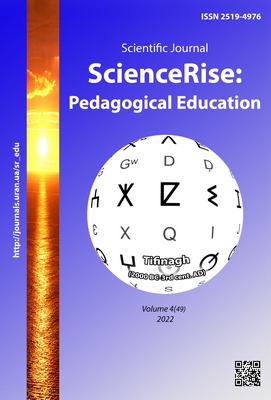The role and place of the discipline “History of mathematics in the 21st century”
DOI:
https://doi.org/10.15587/2519-4984.2022.261307Keywords:
history of mathematics, history of science, scientific worldview, academic discipline, innovative technologies, educational process, higher educationAbstract
The key to the success of educational reform is a comprehensive and thorough training of future specialists in any field, with a broad scientific worldview and a high level of culture. For high-quality training of future professionals, a new stage has begun, characterized by the emergence of innovative technologies in the educational process. In higher educational institutions that train future specialists, there is an interest in the modernization of the educational process. The XXI century is a time of differentiation of sciences, earlier integral science was divided into smaller parts, new branches appeared, scientists specialized, individual researches give way to collective efforts. In such a whirlwind of events, the desire to study in detail and deeply any initial discipline, especially the history of its formation and development, is lost. In the absence of time, historical and mathematical information gradually becomes secondary, and should be consistent, clear, complete and arouse students' interest in the subject.
That is why it is important to emphasize some historical aspects of development, problems of teaching and learning, and possible ways to solve it in the discipline of "history of mathematics".
The research used methods of scientific knowledge: systematic and comparative analysis of literature, work programs, syllabi, pedagogical process on the problem of research, generalization and systematization.
It was found out, that the methods of teaching and learning have changed, although we have the opportunity to work with the latest computer technologies, but the role as an effective means of learning and the place as an integral part of the universal scientific heritage remain unchanged.
It is shown, that the history of mathematics will continue to serve as a discipline that is a kind of link between humanitarian, technical and natural sciences, contributes to the development of a scientific worldview and forms erudition
References
- Panova, S. O. (2017). Purpose and objectives of the educational discipline «history of mathematics» as a propaedeutic course in the professional preparation system of future teachers of mathematics. Visnyk Cherkaskoho universytetu, 12, 54–61.
- Hodovaniuk, T. L. (2009). Metodyka indyvidualnoho navchannia istorii matematyky studentiv pedahohichnykh universytetiv. Kyiv: NPU. im. M. P. Drahomanova, 20.
- Karp, A., Furinghetti, F. (2018). History of Mathematics Teaching and Learning Achievements, Problems, Prospect. ICME-13 Topical Surveys. Springer Nature, 48. doi: http://doi.org/10.1007/978-3-319-31616-1
- Brückler, F. M. (2018). Geschichte der Mathematik. Berlin: Springer Spektrum, 164. doi: http://doi.org/10.1007/978-3-662-55574-3
- Diachuk, M. V. (2017). Znachennia istoryko-matematychnykh znan dlia vchytelia ta vykladacha matematyky. Available at: https://vseosvita.ua/library/znacenna-istoriko-matematicnih-znan-dla-vcitela-ta-vikladaca-matematiki-21144.html
- Sverchevska, I. A. (2017). Istoryko-henetychnyi pidkhid u fakhovii pidhotovtsi maibutnikh uchyteliv matematyky. Fizyko- matematychna osvita, 4 (14), 82–86.
- Clark, K. M. (2019). History and pedagogy of mathematics in mathematics education: History of the field, the potential of current examples, and directions for the future. Eleventh Congress of the European Society for Research in Mathematics Education. Utrecht: Utrecht University, 28.
- Puzyrov, V. Ye. (2015). Vykorystannia istorychnoho materialu pry vykladanni vyshchoi matematyky – odyn z chynnykiv rozvytku piznavalnoho interesu studentiv. Naukovi zapysky Kirovohradskoho derzhavnoho pedahohichnoho universytetu im. V. Vynnychenka, 8, 47–52.
- Besov, L. M. (2004). Istoriia nauky i tekhniky. Kharkiv: NTU, 382.
- Roslova, L. O., Bachurina, M. A. (2019). Mathematical education content in the context of mathematical literacy. EEIA 2019. Education Environment for the Information Age, 673–681. doi: http://doi.org/10.15405/epsbs.2019.09.02.77
- Shestopal, O. V. (2014). Istorychni khvylynky yak diievyi zasib motyvatsii do vyvchennia matematyky. Available at: http://acup.poltava.ua/?page_id=84
- Gazda, I. (2013). Hungarian literature of the universal history of mathematics. Journal of History of Culture, Science and Medicine, 4 (6), 134–141.
- Suntola, T. (2018). The short history of science– or the long path to the union of metaphysics and empiricism. CreateSpace, 256.
- Kyslenko, D. P. (2018). Place and role of innovation technologies in professional training of future guarding expert. Naukovyi visnyk UzhNU, 1 (42), 96–100.
- Mesarosh, L. V. (2021). Research of the online technologies influence on the perception of visual information in physics. Pedagogical Sciences Reality and Perspectives, 1 (79), 206–210. doi: http://doi.org/10.31392/npu-nc.series5.2021.79.1.44
Downloads
Published
How to Cite
Issue
Section
License
Copyright (c) 2022 Livia Mesarosh

This work is licensed under a Creative Commons Attribution 4.0 International License.
Our journal abides by the Creative Commons CC BY copyright rights and permissions for open access journals.
Authors, who are published in this journal, agree to the following conditions:
1. The authors reserve the right to authorship of the work and pass the first publication right of this work to the journal under the terms of a Creative Commons CC BY, which allows others to freely distribute the published research with the obligatory reference to the authors of the original work and the first publication of the work in this journal.
2. The authors have the right to conclude separate supplement agreements that relate to non-exclusive work distribution in the form in which it has been published by the journal (for example, to upload the work to the online storage of the journal or publish it as part of a monograph), provided that the reference to the first publication of the work in this journal is included.








